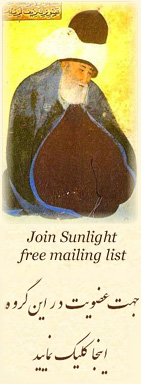Today, Sunlight offers a selection from the Mathnawi, Book VI,
Verses 117-128, in an interpretive version by Coleman Barks, and in
translation by Nicholson. Links to Persian resources may be found at
the end of the post.
^ ^ ^ ^ ^
When We Pray Alone
We are brought thick deserts, and we rarely refuse them.
We worship devoutly when we're with others.
Hours we sit, though we get up quickly
after a few minutes, when we pray alone.
We hurry down the gullet of our wantings.
But these qualities can change,
as minerals in the ground rise inside trees
and become tree, as plant faces an animal
and enters the animal, so a human
can put down the heavy
body baggage and
be light.
-- Version by Coleman Barks
"The Essential Rumi"
HarperSanFrancisco, 1995
~ ~ ~ ~ ~ ~ ~ ~ ~ ~ ~ ~ ~ ~ ~ ~ ~ ~ ~
But they (the mystics) use a comparison and illustration, in
order that a loving, feeble-minded man may apprehend (the truth).
'Tis not a simile, but 'tis a parable for the purpose of
releasing (melting) the frozen intellect.
The intellect is strong in the head but weak in the legs,*
because it is sick* of heart (spiritually decayed) though sound of
body (materially flourishing).
Their (the unspiritual men's) intellect is deeply involved in the
dessert (pleasures) of this world: never, never do they think of
abandoning sensuality.
In the hour of pretension their breasts are (glowing) like the
orient sun, (but) in the hour of pious devotion their endurance is
(brief) as the lightning.
A learned man who shows self-conceit in (displaying) his talents
is faithless as the world at the time for keeping faith.*
At the time when he regards himself (with pride) he is not
contained in the world: he has become lost in the gullet and belly,
like bread.
(Yet) all these (evil) qualities of theirs may become good: evil
does not remain when it turns to seeking good.
If egoism is foul-smelling like semen, (yet) when it attains unto
the spirit (spirituality) it gains light.
Every mineral that sets its face towards (aspires to evolve into)
the plant (the vegetative state)-- life grows from the tree of its
fortune.
Every plant that turns its face towards the (animal) spirit
drinks, like Khizr, from the Fountain of Life.
Once more, when the (animal) spirit sets its face towards the
(Divine)Beloved, it lays down its baggage (and passes) into the life
without end.*
-- Mathnawi VI: 117-128
Translation and Commentary by Reynold A. Nicholson
"The Mathnawi of Jalalu'ddin Rumi"
Published and Distributed by
The Trustees of The "E.J.W. Gibb Memorial"
*weak in the legs: "I.e. it has no strength to search after spiritual
things." (Nicholson)
*sick: "Literally, 'ruined.'" (Nicholson)
*keeping faith: "I.e. when the time comes for him to make good his
pretensions.
*lines 125-28: "See the note on I 3165-3168" ["The corn-seed sown in
the earth becomes bread, which, when eaten, assimilated, and
converted into sperm, produces the man endowed with spirit
(vegetable, animal, and intellectual). The soul, as a mode of Divine
Being, undergoes a similar evolution: in order that its inherent
potentialities may be developed and exhibited, it descends into the
world of matter, where from the lowest phases of soul-life it
gradually rises to the highest and, having traversed the whole circle
of existence and thus attained to the utmost perfection of which it
is capable, gives itself up to God and realises its essential unity
with Him."] (Nicholson, Commentary)
~ ~ ~ ~ ~ ~ ~ ~ ~ ~ ~ ~ ~ ~ ~ ~ ~ ~ ~
The image:
http://tinyurl.com/op22s
The Persian recitation:
http://tinyurl.com/rdjnv
A Persian interpretation:
http://tinyurl.com/owbqk
http://tinyurl.com/o35uj










No comments:
Post a Comment